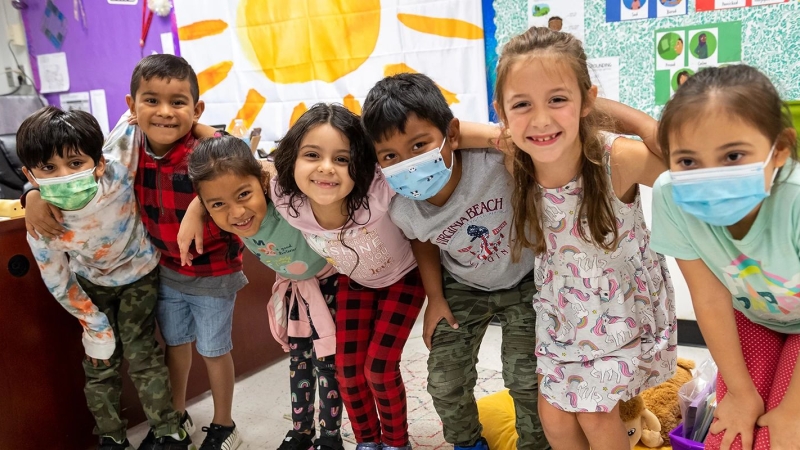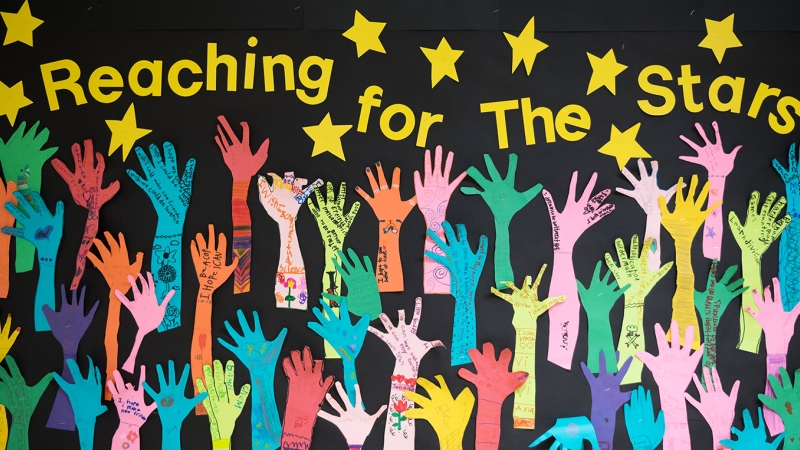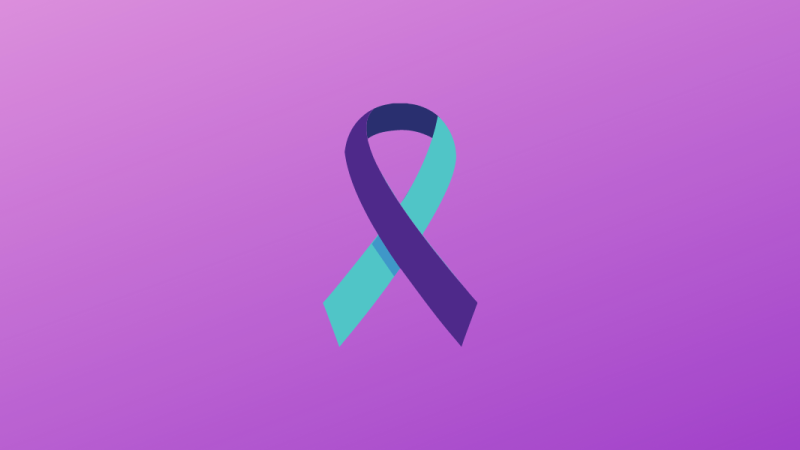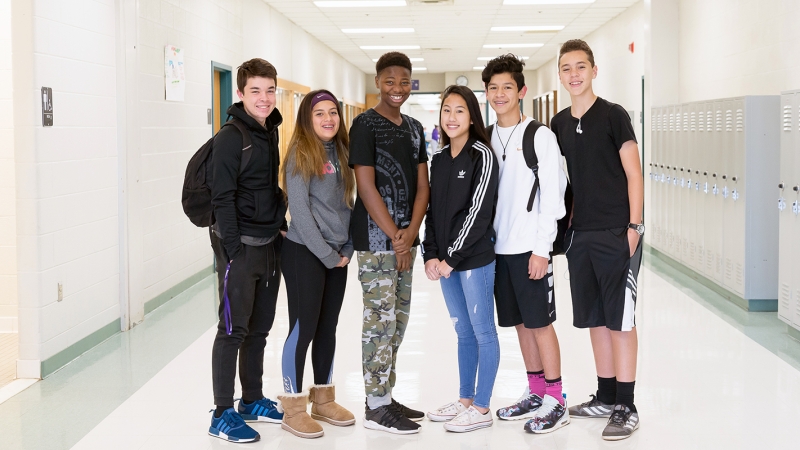Program Profile: Social Work Services
Details and Data for the 2023-24 School Year
Program Overview
The School Social Work program is committed to providing responsive and effective social work services which support student academic achievement and well-being.
The primary purpose of school social work services is to:
-
Remove barriers to student academic success,
-
Mitigate the impact of stressful and challenging situations, and
-
Ensure that all students have access to the educational opportunities needed to achieve their full potential.
Some barriers that inhibit student academic achievement and wellbeing include mental/behavioral health concerns, family stressors, and poverty/resource needs. These factors can also contribute to absenteeism and disengagement from school. Without intervention, they may impede a student's ability to graduate from high school on-time and successfully transition to meaningful post-secondary education or career experiences.
School social workers provide support to students with mental and behavioral health needs through:
-
Counseling support,
-
Referrals to community agencies and services,
-
Consultation with families and school staff, and
-
Case management of services funded by the Children’s Services Act. The Children's Services Act seeks to keep at risk students from requiring more restrictive services and placements through the provision of community-based services and supports.
These services, designed to meet individual student needs, help keep students engaged in school and progressing towards graduation.
School social workers also provide interventions to support students exhibiting attendance issues, addressing the underlying issues that are inhibiting the child's daily, on time attendance.
In addition, school social workers, in partnership with parents and educational professionals, complete sociocultural assessments as a part of the special education evaluation process. The assessment provides educational teams with a comprehensive understanding of what may be impacting a child's academic or behavioral performance and ensures that parents have a formal way to share information about their child’s strengths and needs. School Social Work Services help to build individual student strengths and offer students maximum opportunity to fully engage and participate in the planning and direction of their own learning experiences (adapted from the NASW School Social Work standards).
The COVID-19 pandemic has impacted students’ academic, mental wellness, student attendance and engagement. Although Fairfax County Public Schools, overall division rates of daily, on time attendance are satisfactory, in each school across the division, there are individual students who are missing substantial time from school (10 percent or greater absenteeism rate). Schools and community partners have consistently indicated that greater school-based clinical support to students with chronic absenteeism is essential to addressing the truancy issue.
Program Staff
School Social Workers are highly trained mental health professionals who help educators and families understand the relationships between learning, family contexts, student behavior and mental wellness. The primary goal of the school social work program is to ensure that all students have access to the educational opportunities needed to achieve their individual potential. Fairfax County Public Schools Social Work Program follows the National School Social Work Practice Model published by School Social Work Association of America.
All FCPS Social Workers:
- Hold Master’s Degrees and have completed a two-year supervised internship in addition to their graduate coursework
- Hold pupil personnel licensure through the Virginia Department of Education
- Most FCPS School social workers (over 2/3) are licensed as independent mental health clinicians
- Complete ongoing continuing education requirements to maintain pupil personnel licensure as well as fulfill clinical licensure requirements.
- Possess specialized training to assess and respond to threats of violence or suicidal ideation and are qualified to assess and intervene with mental or behavioral health concerns that impede academic progress or social/emotional well-being.
Student Summary
All FCPS students are eligible to receive services provided by school social workers. Students may be identified or referred for services by parents or by school teams and teachers. Students may also self-refer. In all cases, services are provided in coordination with parent and family input and participation. In addition, students receiving services through identified special education programs or in alternative school programs receive specialized social work support tailored to their individual needs.
School social workers are assigned to every school and special and alternative education site within the school division. Students who are enrolled in preschool through age 22 may receive services.
Locations
- All elementary, middle and high schools
- All nontraditional and alternative schools
- Public day schools and specialized programs for students with disabilities
Services
Preschool/Early Childhood
- Complete intakes and developmental screenings for children who may be experiencing developmental delays or exhibiting concerning behaviors at their preschool or at home.
- Participate in multidisciplinary evaluation of children who exhibit developmental delay or concern
- Provide parents and families with resources and referrals for private or community-based services to address identified areas of need
- Provide training and support to families on variety of topics and issues that support healthy development and growth
- Provide training and consultation to preschool staff, at FCPS preschool sites or community preschool programs
- Provide educationally relevant individual, group or family supportive counseling services to students around academic, social emotional or behavioral concerns
- Participate in school-based multidisciplinary meetings to support students experiencing academic or behavioral difficulties
- Complete sociocultural assessments, in partnership with parents, which provide a comprehensive portrait of relevant history and factors that may impact upon a child’s academic performance as well as his/her social emotional or behavioral functioning
- Connect parents and families to community resources which may assist with meeting basic needs, resources that support mental health and well-being, or specialized services for children with disabilities
- Provide specialized crisis supports to support schools and communities in times of larger scale crisis situations
- Provide crisis intervention services within schools to address individual student concerns
- Promote school attendance, school engagement and on-time graduation for all students by utilizing empirically supported, research-based best practices
- Participate as a member of collaborative school-based team to address concerns regarding student threats of violence, suicidal ideation or significant mental/behavioral health concerns
- Support educational stability and improvements in outcomes for students who are experiencing homelessness or are placed in foster care
- Serve as designated liaison to Child Protective Services agency and provide training and consultation for school staff regarding child abuse and neglect
- Collaborate with community and government agencies in developing plans and case managing services to at-risk children and adolescents through the Virginia Children’s Services Act
- Provide IEP designated counseling services and social skills training to special education students during the regular school year as well as through extended school year summer program
- Collaborate in the development of functional behavioral assessment and behavioral intervention plans
- Support county and FCPS initiatives to facilitate family involvement/engagement and improved access to services which support healthy child development, mental and physical well-being, and academic and post-secondary success
- Assist students and families with accessing homebound educational services when students are unable to attend school due to health needs
- Provide additional support to students who had been suspended due to a disciplinary infraction
- Provide trainings and educational programs that support student achievement and mental health and wellness
School social workers engage in ongoing data collection and intervention/program evaluation to assess and monitor student progress and the effectiveness of selected interventions and programs. School wide or student specific interventions are selected based upon school or student needs or school improvement plan goals/objectives as determined through a needs assessment.
Social workers complete sociocultural assessments for students being considered for special education eligibility. As a part of the assessment, the Vineland Adaptive Behavioral Scales assessment may be administered by school social workers. This standardized evaluation tool is utilized to provide a measure of adaptive behavior for students being considered for certain special education services.
In addition, school social workers who refer students for services through the Virginia Children’s Services Act are required to complete a standardized functional assessment scale for each child at regular intervals throughout the duration of services. The Child and Adolescent Needs and Strengths (CANS), is a comprehensive assessment tool implemented across Virginia for use in individual case management planning and evaluation of service systems that address the mental health of children, adolescents and their families. School social workers are required to complete annual certification in order to administer the CANS.
School social workers may utilize approved evidence-based or best practices programs or approaches to support student growth and progress and/or identified student needs. Examples include social skills or problem solving curricula such as Coping Cat, Girls Circle, Boys Council, Unstuck and on Target and Superflex(social skills), SOS(Signs of Suicide), Check & Connect (attendance/school engagement), MindUp, Kimochis, Learning 2 Breathe, Strong Kids/Strong Teen, Too Good for Violence and Zones of Regulation (social emotional learning), Youth Mental Health First Aid (youth mental health literacy and awareness training). School Social Workers trained in Sibshops and Parent Project deliver these family trainings several times throughout the school year.
School social workers provide services in individual, group or classroom settings and may also deliver training and consultation to parents, educational professionals or community members based upon request or identified need. Training materials and curriculums about Bullying Prevention/Intervention, Social Emotional learning curriculum, Crisis Response, and Depression Awareness/Suicide Prevention are available and are congruent with national practice models. School social workers may also develop training or other resources for staff, families or the community using local, state and national models and materials.
School Social Workers are trained mental health professionals with specialized skills and expertise that help support student academic achievement and social emotional well-being and competence. School social workers seek to improve outcomes for students by providing services and support which are linked to academic achievement, the development of essential life skills and a sense of community and citizenship.
Professional Development for social workers for the 2023-2024 school year will continue to focus primarily on effective interventions for attendance, mental health and wellness concerns such as trauma informed practice, the use of surveys and other data to effectively analyze the impact of an intervention on student outcomes, and the use of other empirically supported or evidence based interventions designed to improve or positively impact student well-being. All of these ultimately impact student achievement. In addition, school social workers will participate in professional development opportunities through embedded collaborative learning teams and through the use of webinars, zoom training sessions or other digital options. Training will include crisis response, child abuse and neglect, risk prevention, Multi-tiered System of Support (MTSS), Student Engagement and Attendance best practices and support of students with social emotional concerns. New and systematized resources for school social workers, school psychologists and school counselors have been developed for use when responding to crisis, risk assessments, depression awareness, bullying prevention and intervention.
2022-23 Goals
Every school social worker will implement a specific, targeted intervention designed to improve student engagement, attendance, or mental health and wellness. In order to more effectively assess student outcomes, each social worker will utilize with parent permission and measure student outcomes as well as student attendance data, behavior and academic outcomes.
- Goal 1: Student Engagement Attendance
By June 2023, selected/referred students who experience barriers to learning or have a 10% or greater absenteeism rate will receive targeted interventions facilitated by a school social worker with support of other MTSS team members. As a result of these efforts, outcomes through student’s attendance in SIS will demonstrate improvement in school attendance as indicated through the student’s attendance data. Aggregate monthly data of students served by Check and Connect mentors are tracked by social workers. - Goal 2: Mental Health and Wellness
School social workers will provide educational programs, screenings, professional development, small group, and individual intervention services to address concerns regarding mental health and wellness. By June 2023, as a result of the systematized and division wide efforts to provide evidence-based curriculum, outcomes will be met for students demonstrating improvement as indicated through the student attendance, behavior, and academic measures. - Goal 3: Intensive Case Management Services
Students who receive CSA Services/Case Management by FCPS School Social Workers School Social Workers are lead Children’s Services Act (CSA) case managers for students and families in FCPS. This law was enacted in 1993 that establishes a single state pool of funds to purchase intensive mental health services for at-risk youth and their families. The state funds, combined with local community funds, are managed by local interagency teams who plan and oversee services to youth. School social workers will provide lead case management services appropriate to schools domains to support access to community based services. - Goal 4: Trauma-Sensitive Schools
School social workers will provide professional development for school staff to promote trauma-sensitive practices in school communities. School staff attending Building a Trauma Informed Classroom Academy classes will support building Trauma Informed Schools in school personnel understanding and capacity to provide trauma-sensitive practices in schools.
Future Focus
The future focus for school social work services:
- Continue to implement evidence or empirically supported interventions which support student academic achievement, development of resilience and coping skills and mental well-being of students.
- Utilize youth survey data to provide targeted and specific interventions to pyramids that effectively address areas of concern and support the development and fostering of assets and protective factors.
- Analyze impact of interventions on student achievement and well-being using systematized data gathering (use of pre/post surveys, analysis of attendance and grades of students who receive interventions).
- Continue to work collaboratively with our partners from school counseling and school psychology through the various components of the Risk Prevention; Bullying Prevention and Intervention; Depression Awareness and Suicide Prevention; Crisis Intervention and Support, and Multi-tiered System of Support (MTSS) teams.
- Further develop and strengthen partnerships and collaborations with county and nonprofit partners around pyramid-based resourcing projects.
- Given the changing demographics of our county and the increase in numbers of students living in poverty, school social workers will continue to provide information and support to schools regarding the potential educational impacts of poverty. School social workers will provide expertise and consultation to families to assist them in securing necessary resources which allow children to fully access educational opportunities.
School social workers will provide expertise and consultation to families to assist them in securing necessary resources which allow children to fully access educational opportunities.
FCPS school social work goals are rooted in the FCPS Student Achievement Goals and the division- wide focus on collaborative and analytical work to eliminate achievement gaps, ensure on time graduation for each student, and raise the bar to ensure positive outcomes for every student in FCPS.
School social work services continue to make progress towards the goal of providing evidence-based practice interventions which directly support student achievement in academics and essential life skills. School social workers provided targeted interventions designed to improve school attendance, school engagement, and student mental health well-being. In 2023-24, school social workers will support targeted interventions designed to improve school attendance, school engagement and student’s mental health.
Goal 1: Improve Attendance
Offer Check & Connect intervention and training for school social workers and other school personnel who are implementing the Check & Connect intervention. School social workers are the coordinators of the Check & Connect interventions in schools. 427 students were mentored monthly by a Check & Connect mentor in 2022-23.
Check & Connect continues to be one of the mentoring student engagement interventions that shows positive results for regular student attendance. Due to the COVID recovery response in schools and throughout the COVID pandemic, efforts are being made to continue to improve student attendance in schools. Professional development training and resources to support the fidelity of implementation of Check and Connect practices are provided in the fall of every school year.
Goal 2: Mental Health and Wellness
School social workers provide educational programs in collaboration with MTSS teams SOS screenings, training, small group, and individual services to address concerns regarding mental health and wellness of students. By June 2023, school social workers will continue to provide counseling services through individual and group interventions in schools.
In 2022-23, school social workers provided 5,782 group interventions and 26,835 individual counseling sessions, and 3,376 risk assessments. In 2022-23, goal attainment data collection was collected through aggregate data to support streamlining social workers’ time needed for supporting direct services within their schools.
In 2022-23, Saturday sibshops were offered in the fall, winter and spring to support students in 2nd through 6th grades who have a sibling in special education services. These sibling student sessions were held with children celebrating many strengths that neurotypical siblings have compared to children who do not have a sibling with a disability and tips to support students while also supporting the child with a disability. Sibshops were offered in person to provide support to siblings of students with special needs to celebrate the contributions made by siblings of students with special needs, share their experiences and receive peer support.
Goal 3: Students who receive CSA Services/Case Management by FCPS School Social Workers
School Social Workers are lead Children’s Services Act (CSA) case managers for students and families in FCPS. This law was enacted in 1993 that establishes a single state pool of funds to purchase intensive mental health services for at-risk youth and their families. The state funds, combined with local community funds, are managed by local interagency teams who plan and oversee services to youth.
FCPS school social workers provided lead intensive case management services for 409 children/youth and families with CSA services in the 2022-2023 school year and school social workers held 2659 Family Resource Meetings/Family Partnership Meetings to support accessing mental health services for students.
The data below provides information about the range of social work services provided to students, staff and families in SY 2021-22 and 2022-23. It is difficult to capture the outcomes of prevention efforts or measure things that didn’t happen as a result of services or interventions. However, in general, research substantiates that students who receive supportive services to address issues that impact school performance demonstrate improvement as a result of tiered interventions and supports.
Comparison of school social work services provided 2021-22 and 2022-23
|
Service/Intervention |
2021-22 |
2022-23 |
|---|---|---|
|
Initial Sociocultural Assessments |
3282 |
3896 |
|
Re-evaluation Sociocultural Assessments |
3000 |
2769 |
|
Individual Student Counseling Sessions |
25,906 |
26,835 |
|
Group Counseling Sessions |
5497 |
5782 |
|
Child Abuse Reports |
1175 |
918 |
|
Homebound/Home Based Referrals/Consultations |
833 Referrals |
1205 Referrals |
|
Referrals to social workers for student or |
25,639 |
23,849 |
|
Attendance interventions or referrals to attendance officer for problem solving or student support |
4914 |
8690 |
|
Referrals to community agencies |
20,728 |
19,130 |
|
CSA Case Management |
222 |
230 |
|
CSA Meetings |
2430 |
2659 |
|
Participation in school-based team meetings to discuss concerns about student performance or behavior |
64,754 |
65,416 |
Contact: Mary Jo Davis, [email protected]




